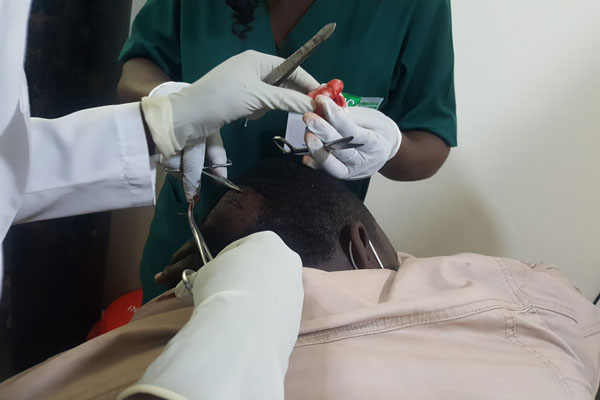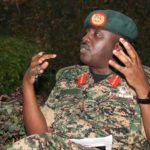After a violent campaign season in which dozens of journalists were assaulted by security agencies, the Executive Director of Human Rights Network for Journalists-Uganda, Robert Sempala says media owners should be at the forefront of backing journalists when fighting for their rights.
Sempala says media owners have a central loud voice which can be heard by anyone and which reach beyond where journalists cannot. He also argues that media owners should invest in providing protective gears to journalists.
“You do not see the main bosses (media owners) coming to court when journalists sue,” Sempala says. “You only see the colleagues (journalists) come support their colleagues in courts of law, you do not see managers, owners and editors coming to show the solidarity.”
When journalists are arrested or beaten, media owners under the National Association of Broadcasters (NAB), should be issuing statements condemning such arrests.
The only statement on NAB website that mentions safety of journalists was published in October 2020, almost a month before the start of campaign season when the association members met security chiefs.
“NAB raised issues of concern to the security chiefs including the safety of the journalists during their line of duty, interruption of the media while doing their work as the fourth estate,” the statement reads.
But NAB Secretary General Joseph Beyanga defends the association, arguing that they have done much lobbying for journalists. He says NAB should not be judged basing on election season. For instance, he argues that during the pandemic, before the election, they lobbied to ensure that journalists are classified as essential workers and also lobbied for release of journalists arrested for defying curfew time.
After the October 2020 meeting with security chiefs, Beyanga says a sub-committee composed of NAB and security agencies members through which the former continued to raise issues affecting journalists. Unknown are the impacts of these meetings in defense of journalists rights.
In an interview with this reporter, Sempala commended the recently founded Uganda Editors Guild, an umbrella body that brings together editors, senior journalists and journalism for the role it played, in defense of the journalists during election season.
The guild condemned arrest of journalists and sued, in attempt to block Media Council’s move to accredit journalists covering campaigns in the middle of campaign season.
Sempala says they have recorded more than 35 clear cases in which security agencies confronted journalists during campaigns, mainly those who were covering National Unity Platform (NUP) candidate Robert Kyagulanyi aka Bobi Wine.
Other incidents that affected the media, he says include brutality against media team of Bobi Wine such as those who were live broadcasting his rallies. Three Bobi Wine media aides were among his campaign trail members who were arrested on December 30th in Kampala and have been produced in court. They are Richard Kalema, Geofrey Mutalwa and Musa Mulimira. These are among 46 Bobi Wine supporters arrested in Kalangala who have not been given bail.
Incidents involving journalists started with the start of campaign season. For instance, on 3 November 2020, Bobi Wine was nominated, a number of journalists from different media houses following his convoy to the nomination venue were pepper-sprayed by police.
Also on November 3rd, Ronald Kakooza of Vision Group was arrested while covering events at the Forum for Democratic Change headquarters in Najjanankumbi as the party candidate Patrick Amuriat prepared to go for nomination.
“Journalists have operated in a hostile and toxic environment, and endured several cases of wanton mistreatment by police and security agencies,” the Africa Center for Media Excellence (ACME) said its December report on election coverage.
But Dr George Lugalambi, a media researcher says there is nothing else that journalists and media owners could do at the organizational level because the campaign became extremely violent. He says security agencies must protect Ugandans including journalists. “They are the people who were abusing media rights.”
Dr William Tayeebwa of Makerere University Journalism Department says as the campaign season turned more violent, media owners should have provided protective gear for all field personnel as a measure to mitigate the impact of the attacks.
“It is only journalists from big media houses who had protective gear. Those who were brutalized had no gear.” Given that politics has become like a war zone, Tayeebwa says, the safety of journalists should equally be a top priority for proprietors.
Meanwhile, Derrick Wandera, a reporter with Daily Monitor says that his employers replaced his equipment and mobile phone which were confiscated and damaged by security officers during one of Kyagulanyi’s rallies. But he says that after spending 62 days on the campaign trail, he realized that a lot needs to be done in support of journalists covering hostile situations.
“Employers should make sure that there is job security for reporters especially those working in dangerous environments,” he says. “There should also be medical insurance to even freelance reporters because most of them when they get a challenge that needs medical attention, they are left to suffer and cannot pay their medical bills.”
Moses Waiswa a journalist attached to Busoga One FM was beaten by counter-terrorism police officers while covering Bobi Wine’s campaign trail in Lira.
Waiswa says that despite the injuries he sustained while on duty, his employers did not do much to ensure he gets clear medical treatment. According to Waiswa, his employer gave him a one-off payment of 350,000 Shillings, yet to date; he has spent 3.6 million on treatment. Waiswa said he was directed by doctors to spend 60-days off work for him to be able to recover quickly.








